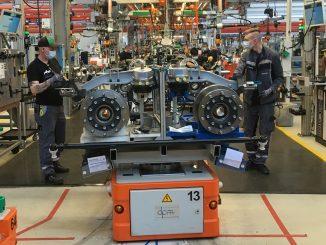
The impact of the Covid-19 pandemic on manufacturing is expected to cut annual light commercial vehicle production volumes by a third to just 920,000 units this year, according to a report by the Society of Motor Manufacturers and Traders (SMMT).
The SMMT second Annual Trade Report for 2020, launched today (23 June), reveals that the UK new light commercial vehicle (LCV) market declined by 86.2% in April with just 3,387 LCVs joining UK roads - 21,217 fewer than in the same month last year.
In May, the UK new LCV market fell by 74.1%, with the majority of vehicles delivered to fleets running food distribution, home delivery, utilities, broadband and emergency services operations.
The report calculates that with a tariff-free FTA in place, full recovery from the impact of the pandemic is expected to take up to five years, with output reaching pre-crisis levels of 1.35 million units by 2025.
However, it warns that a ‘no deal’ Brexit scenario would severely damage these prospects and could see volumes falling below 850,000 by 2025 – the lowest level since 1953.
The SMMT calculates this would mean a £40bn cut in revenues, on top of the £33.5bn cost of Covid-19 production losses over the period.
The report sets out key recommendations for government and industry to help the sector recover, find new opportunities and new markets and grow existing trade relationships.
Launching the report at the industry’s annual summit, SMMT chief executive Mike Hawes warned that the impact of the pandemic is in danger of being amplified by the prospect of a ‘bare bones’ or no-deal Brexit.
He said: “Covid has consumed every inch of capability and capacity and the industry has not the resource, the time nor the clarity to prepare for a further shock of a hard Brexit.
“That’s why we do need to ‘turbo charge’ the negotiations to secure a comprehensive Free Trade Agreement with the EU that maintains tariff and quota free trade.
He added: “With such a deal, a strong recovery is possible. We can safeguard the industry and our reputation as an attractive destination for foreign investment and a major trade player.”
Hawes also called for further government action to save jobs in the sector.
He said: “Government’s intervention has been unprecedented. But the job isn’t done yet. Just as we have seen in other countries, we need a package of support to restart; to build demand, volumes and growth, and keep the UK at the forefront of the global automotive industry to drive long-term investment, innovation and economic growth.
“Support delivered now is an investment in the future of one of Britain’s most valuable assets… investment that we will repay many times over,” he added.













